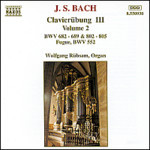
Clavierubung III, Vol. 2
 $25.00
Low Stock
add to cart
$25.00
Low Stock
add to cart
J.S. BACH
Clavierubung III, Vol. 2
Wolfgang Rubsam (organ)
[ Naxos / CD ]
Release Date: Monday 26 December 2005
Should this item be out of stock at the time of your order, we would expect to be able to supply it to you within 2 - 5 business days.
"Jando at his best is "He breathes real vitality into them with varied and imaginative registrations"
- Gramophone
Johann Sebastian Bach was a member of a family that had for generations been occupied in music. His sons were to continue the tradition, providing the foundation of a new style of music that prevailed in the later part of the eighteenth century. Johann Sebastian Bach himself represented the end of an age, the culmination of the Baroque in a magnificent synthesis of Italian melodic invention, French rhythmic dance forms and German contrapuntal mastery.
Born in Eisenach in 1685, Bach was educated largely by his eldest brother, after the early death of his parents. At the age of eighteen he embarked on his career as a musician, serving first as a court musician at Weimar, before appointment as organist at Arnstadt. Four years later he moved to Mühlhausen as organist and the following year became organist and chamber musician to Duke Wilhelm Ernst of Weimar. Securing his release with difficulty, in 1717 he was appointed Kapellmeister to Prince Leopold of Anhalt-Cöthen and remained at Cöthen until 1723, when he moved to Leipzig as Cantor at the School of St. Thomas, with responsibility for the music of the five principal city churches. Bach was to remain in Leipzig until his death in 1750.
As a craftsman obliged to fulfil the terms of his employment, Bach provided music suited to his various appointments. It was natural that his earlier work as an organist and something of an expert on the construction of organs, should result in music for that instrument. At Cöthen, where the Pietist leanings of the court made church music unnecessary, he provided a quantity of instrumental music for the court orchestra and its players. In Leipzig he began by composing series of cantatas for the church year, later turning his attention to instrumental music for the Collegium musicum of the University, and to the collection and ordering of his own compositions.
Tracks:
Clavierubung III Vol. 2
Vater unser im Himmelreich, BWV 682
Vater unser im Himmelreich (alio modo), BWV 683
Christ, unser Herr, zum Jordan kam, BWV 684
Christ, unser Herr, zum Jordan kam (alio modo), BWV 685
Aus tiefer Not schrei' ich zu dir, BWV 686
Aus tiefer Not schrei' ich zu dir (alio modo), BWV 687
Jesus Christus, unser Heiland,
der von uns den Zorn Gottes wandt, BWV 688
Fuga super: Jesus Christus, unser Heiland, BWV 689
Duetto I, BWV 802
Duetto II, BWV 803
Duetto III, BWV 804
Duetto IV, BWV 805
Fugue in E Flat Major, BWV 552
![Das Orgelbuchlein [Little Organ Book] Vol. 2 cover](https://images.marbecks.co.nz/_thumbnails/10131/10131505.jpg)